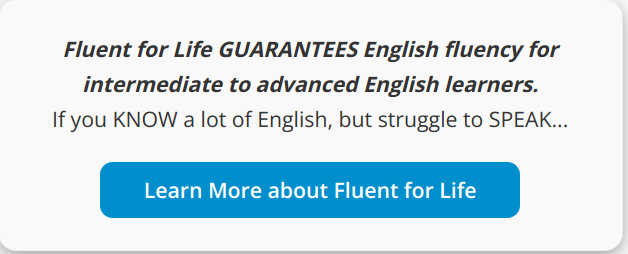English
Speaking Confidently at Work: 25 Business English Phrases

Many English learners believe that using complicated words and phrases is necessary for successful business communication, but this simply isn’t the case.
Cognitive Fluency research has suggested that simpler language is far more credible.
Imagine the impact of attending a meeting where someone is spouting industry-specific jargon – it would be difficult to understand, and would make them look like they are trying too hard.
That’s why keeping your wording unambiguous and easy to comprehend should always be your top priority when speaking with clients and colleagues.
In this blog post, I’ll talk about the central aspects of business English and provide tips on how you can simplify your message, select suitable vocabulary, and communicate ideas in an efficient manner.
TABLE OF CONTENTS:
- Conversational English Leads to Professional Success
- Important Aspects of Business Communication
- Business English Phrases
- Applying for Jobs
- Sending Emails
- Connecting With Coworkers
- Online Meetings
- Productivity

The Benefits of Conversational English for Professional Success
Gerry Spence is a renowned American attorney, known for his prestigious and polemic cases. His career spanning many decades has only seen victory in criminal trials, securing numerous multi-million dollar verdicts.
In his memoir How to Argue and Win Every Time, Spence recollects an influential moment of his professional life.
He observed when he was in court and debating with attorneys from prominent institutions such as Harvard or Yale, they spoke using intricate jargon.
It dawned upon him that the jury consisted of everyday people, so he made an effort to speak in a way they would comprehend – plain English.
Bestowing investiture on directness turned out to be one of the primary factors contributing to his success.
How Does Technical Vocabulary Fit In?
It is important to be aware of the technical terminology related to one’s job. From my experience, this type of language is generally what English students are most familiar with.
That said, it is possible to become accustomed to the necessary technical vocabulary through prolonged exposure.
The common issues I notice among my students include having difficulty conversing about business-related matters, such as comprehending idioms and informal phrases, and struggling with conversations outside of work – for instance, regarding their weekend activities.
Therefore, if you wish to develop your English speaking skills in order to progress professionally, it may be best practice to focus on developing basic conversational language.
Communication in Business: 3 Important Aspects

For many non-native English speakers, mastering conversational English in a professional environment is challenging.
Our goal is to help you speak English fluently and effectively.
1. Confidence is the first step
Confidence in professional life is essential.
When you master speaking English competently, not only will you earn your colleagues’ and clients’ respect, but they will also value your input.
Establishing yourself as an authority can be done when you present a proposal, negotiate a deal or network with associates and customers.
Thankfully, attaining speaking confidence isn’t as strenuous as it seems. It’s similar to learning how to ride a bicycle
At first, it might appear complicated and cause you to feel insecure.
However, the more practice you have, the better your understanding of riding a bike will become until eventually you are zooming around without having to worry about falling off or needing help – this is what fortifies confidence.
Therefore, to truly excel at speaking English fluently it is best to focus on comprehending vocabulary well rather than just regurgitating words and sentences.
2. Simplicity
Sherwin Cody was an American author and teacher renowned for his work in the field of English language and grammar.
He taught native English speakers to communicate effectively, gain respect and elevate their careers.
His interest in linguistics and instruction were reflected in his many publications, including one that popularized “plain English”: a form of expression using only simple words and phrases.
His teachings had a substantial influence on the English language today as well as its teaching practices.
Plain English proves advantageous for both speaker and listener:
- it’s easily understandable,
- appeals to all levels of expertise,
- makes the speaker appear more intelligent,
- builds trust through enhanced communication
- and sets an organization apart from its competition by enhancing sales and customer loyalty.
Unsurprisingly, even very educated people prefer plain language.
3. Phrases for Work
It’s important to say the right thing at the right time — so you need to know what phrases to use in specific situations.
In order to improve your fluency and communicate effectively on the job, you must learn English phrases used in business environments.
But remember that knowing the specific phrases is only half the battle – you need to remember them in context for them to be memorable and effective.
Business English Phrases (For Work and Leisure)
You’ll learn phrases that will help you communicate with your colleagues in this section, which covers five important real-life situations.
Applying for Jobs: 5 Phrases to Include in Your CV

(You can also use these phrases in your conversations!) If you’re looking for your dream job, here are some useful phrases to include in your CV.
1. Hit the ground running
Think about a soldier parachuting into battle – hitting the ground running in order to make it to the fight quickly.
This type of quick adaptation and contribution can be showcased in your CV too – for instance, how you picked up a new system in one day or improved the on boarding process within your first week.
“At my previous job, I hit the ground running by learning their support system in a single day.”
“I joined XYZ company and hit the ground running by improving the onboarding process my first week on the job, reducing new hire training time by 20%.”
2. Go the extra mile
Going beyond what’s expected shows dedication and a willingness to put in hard work.
For example, running an extra mile on top of the initial 10 miles is an effort that demonstrates this kind of commitment.
This can be exemplified in CVs by recounting instances where you pushed yourself to do more than was required, such as working overtime or finding cost-saving opportunities.
“During a challenging project, I went the extra mile by working overtime to make sure the project was completed on time.”
“I consistently went the extra mile by identifying cost-saving opportunities, resulting in annual savings of $50,000 for the company.”
3. Team player
This phrase refers to someone who works well with others and contributes effectively to a team’s success.
It can be used to highlight your collaboration skills and ability to work well with colleagues.
For example, “I’m a strong team player, I actively created a safe environment where everyone could share their opinion on how to achieve our goals.”
“I have also organized team-building activities as a team player.”
4. Think outside the box.
You can think of it as solving a puzzle.
The “box” is the typical solution area.
If someone thinks outside the box, they’re resourceful and can come up with solutions that others may not have thought of.
To demonstrate your creative thinking and problem-solving abilities, include this phrase in your resume.
- “I’m good at thinking outside the box. I developed innovative strategies that drove business growth by 25%.”
- “I solved a complex customer issue by thinking outside the box. My customized solution led to high customer satisfaction.”
5. Keep your eye on the ball.
This phrase has its roots in sports, where you have to stay focused on the ball.
In a more general sense, it implies that one should remain attentive to their goals and objectives.
It can be applied to any situation requiring diligence and hard work.
For instance, I demonstrated my commitment by staying focused throughout a complex project and thereby reached our monthly goal.
- “In a fast-paced environment, I kept my eye on the ball by prioritizing tasks and achieved our monthly goal.”
- “I managed a complex project by keeping my eye on the ball, consistently monitoring key milestones.”
Sending Emails: How to Start and End an Email

You can improve your email writing skills and sound more professional by using these common phrases.
1. Dear…
This is a common and polite way to start an email to someone you don’t know very well or in a professional context. For example:
- Dear Hiring Manager,
- Dear Mr. Smith,
You can also replace Dear with Greetings such as Greetings Mr. Smith,
2. I hope this email finds you well.
This is a friendly way to start an email and show that you care about the person’s well-being.
It’s a nice way to make someone feel like you care about them even if you just want some basic information. For example:
“I hope this email finds you well. I wanted to catch up on the project we discussed last week.”
“I hope this email finds you well. I’m getting in touch to see if you’re interested in collaborating on a new project.”
3. As per our conversation
You can use this phrase to refer to an older conversation or an agreement you made with the person.
This is a more formal way of saying “about,” or “concerning.”
Place this phrase at or near the beginning of your email to direct the reader’s attention. For instance:
“As per our conversation last week, we agreed to have the meeting this Friday.”
“As per our meeting, I’ve attached the requested documents for your review.”
You can also say: As discussed … For instance: As discussed last week, we agreed to have the meeting this Friday
4. Please don’t hesitate to contact me.
At the end of your email, encourage someone to reach out to you if they need anything, or have any questions. For example:
- “Please don’t hesitate to contact me if you need any further information about the project.”
- “If you have any questions about the event, please don’t hesitate to contact me.”
5. Best regards,
This is a professional and polite way to end an email. It goes right before your name. Like this:
- Best regards, John Santos
- Best regards, Jane Cantor
5 Phrases to Use When Talking About the Weekend

Here are some useful phrases to talk about your weekend with your coworkers!
1. Kick back and relax
You’re sitting on the sofa, watching your favorite TV show, your feet up on something and you’re enjoying your leisure time. You can also use this to discuss activities that help you unwind and de-stress because they don’t require much mental energy.
- “This weekend I’m kicking back and relaxing by binge-watching Game of Thrones.” (When you binge on something, you’re getting a lot of it.)
- “I headed to the beach with a good book and a picnic basket. I found a spot in the shade, kicked back and relaxed.”
2. Chill out
Like the previous phrase, this also means relaxing, taking it easy, and not worrying too much about things.
- “I needed to chill out during the weekend. I spent time with my friends and walked my dog.”
- “We went to the park, spread out a blanket, and chilled out listening to music.”
3. TGIF! (Thank God/goodness it’s Friday!)
Show your relief and excitement that the week is coming to an end. It could be that you had a difficult week or that you can’t wait until the weekend. For example:
- “TGIF, everyone! Any fun plans for the weekend? I can’t wait to unwind and enjoy some delicious food.”
- “TGIF! I’m meeting friends for cocktails at a rooftop bar.”
4. Weekend getaway
This is a short trip or vacation taken over the weekend to relax and explore new places. For example:
- “I’m planning a weekend getaway to the mountains. I can’t wait to disconnect from work and enjoy the scenic views.”
- “My wife and I planned a little weekend getaway. We rented a cozy cabin in the woods, surrounded by nature, hiked scenic trails, had bonfires, and even spotted some wildlife.”
5. Family time
It means spending quality time with family members. For example:
- “I had some great family time over the weekend. We had a barbecue in the backyard and played board games.”
- “My parents are coming to visit me over the weekend, and we’re going to the zoo for some family time.”
Zoom Meetings: 5 Useful Phrases

If you use the right phrases, you can communicate more effectively, and be remembered as a professional member of the team.
1. Let’s get the ball rolling.
You can think of it as a snowball rolling downhill. At first, it’s small. But as it keeps rolling and picks up speed, it becomes bigger. You can use this phrase to start an activity or initiate a process. You can use it to encourage others to start a discussion or take action during a meeting.
- “We’ve discussed the problem long enough. It’s time to get the ball rolling and move forward with a solution.
- “Let’s get the ball rolling with a brainstorming session to generate ideas for the marketing campaign.”
2. Thanks for joining!
This is a simple and polite way to say thank you to the other participants for attending the meeting. Use it at the beginning or end of the meeting.
- “Thanks for joining, everyone! Let’s get started.”
- “Thanks for joining today! We’ll follow up with an email summarizing the next steps.”
3. Cut to the chase
When you’re watching a movie, there is a long buildup to a thrilling chase scene. Someone says, “Cut to the chase!” This means they want you to skip all the buildup and get straight to the exciting scene. In other words, this phrase implies getting to the point or essential information without wasting time on unnecessary details. You can use it in a meeting to encourage people to focus on the most important points.
- “We have a lot to cover in this meeting, so let’s cut to the chase and focus on the action items.”
- “I appreciate the background information, but let’s cut to the chase and discuss the potential solutions.”
4. The elephant in the room
Imagine walking into the office one morning and finding an elephant in the conference room. The fact that no one speaks about it shows that there is obviously an issue that everyone is aware of, but are too scared or hesitant to bring up. It’s a situation that demands to be addressed.
- “I think we all noticed the drop in ratings. It’s time to address the elephant in the room and discuss ways to improve it.”
- “The budget cuts are affecting our productivity, and it’s the elephant in the room! We need to talk about finding workable solutions.”
5. Let’s wrap it up.
When you want to end the meeting, this is a polite way to say that it’s almost time to end the call. It lets everyone know that if there’s anything important to talk about, they should bring it up now. It’s like wrapping a present.
- “We’ve covered everything on the agenda. Let’s wrap it up.”
- “We’re almost out of time. Let’s wrap it up and move on to the next item.”
5 Phrases About Time and Deadlines for Productivity

You can use these phrases to get things done at work, whether you’re dealing with a tight deadline or trying to manage your time more effectively.
1. On the clock
Think about when workers had to physically punch time cards to record their working hours. When they punched in, a time clock started recording their working hours, so they were “on” the clock. Working from home is becoming increasingly popular, but it is still helpful to separate work from play. If you’re working right now, use this phrase.
- “I can’t hang out this weekend; I’m on the clock at work.”
- “We’ll have to discuss this off the clock, during our break.”
2. Cutting it close
Imagine you’re running a race, and you cross the finish line with only a split second to spare. That’s what “cutting it close” feels like. It’s like pushing the limits and getting things done at the last minute, leaving no room for mistakes.
- “We’re cutting it close with the project deadline. But if we work together, we can get it done on time.”
- “I was cutting it close with my presentation; I finished it five minutes before the meeting started!”
3. Time flies
Sometimes when you’re so absorbed in what you’re doing, you can go into a flow state. It’s a state of deep concentration and focus, when you’re fully present in the moment. Time seems to pass by effortlessly. In this state, time seems to fly by.
- “I can’t believe it’s already 5 p.m. Time flies when you’re busy.”
- “This weekend flew by! I can’t believe it’s Monday already.”
4. Time is money
It means that time is valuable and should not be wasted because it has a direct impact on your success. Similarly, you shouldn’t waste your time. Here are some examples:
- “I always try to plan my day and make a to-do list. You know, time is money, and I don’t want to waste a minute on unnecessary stuff.”
- “Hey, stop scrolling through social media during work hours; time is money, and we’ve got deadlines to meet!”
5. I need it yesterday.
When you say you need something yesterday, it means you need it immediately or as soon as possible. Your top priority should be this.
- “I need that report yesterday, the client is waiting for it.”
- “I have a tight deadline for this project, so I need the information from you yesterday.”

Fluent For Life Will Prepare You for Real Life Better Than Business English Courses.
It’s essential to evaluate the conversational capability of business English courses. Without it, you may be left with the knowledge of a fancy sports car but without the driving skills. My course focuses on helping you to speak confidently and engage in conversations with ease – both inside and outside of work. This will allow you to establish meaningful connections within the business world.
Sign up for Fluent For Life here.

